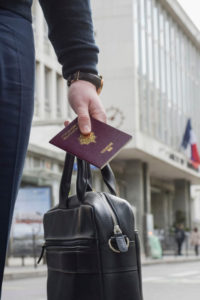A Crown World Mobility Brexit Survey which sought to find out what Europeans including those in the UK, think of Brexit has revealed the extent of their fears and the challenges faced in global mobility.
 Ever since the UK voted in a referendum to leave the EU, most of the focus has been on what kind of impact it will have on the UK economy ahead of a March 29 deadline next year.
Ever since the UK voted in a referendum to leave the EU, most of the focus has been on what kind of impact it will have on the UK economy ahead of a March 29 deadline next year.
But Crown World Mobility, as an expert in helping corporations manage global talent, wanted to find out how other countries in Europe feel about Brexit too and what it will mean to those working outside of the UK.
The extensive survey polled 2,505 German, Dutch and Irish respondents and 1,013 in the UK who all work for companies which offer international assignments. The very people whose working lives could be affected most by Brexit.
It found that:

- The biggest fear in Germany, with 45 per cent, was that it will be harder and more expensive to work in the UK.
- Germans also feared that Brexit will affect exports (44 per cent) and make it harder to employ UK citizens (29 per cent)
- In the Netherlands, the biggest fear was also that it will be harder and more expensive to work in the UK (41 per cent). The effect on exports (38 per cent) and imports (27 per cent) were next.
- In Ireland, the number one fear was that it would be more expensive to work in the UK (41 per cent).
Phil Smith, Global Director, Financial and Compensation Services, Crown World Mobility, said: “These results demonstrate a significant level of concern across Europe now for what Brexit is going to eventually look like.
“The future relationship between the EU and the UK is still unclear at this stage, even with only five months to go, and that lack of clarity is driving a mixed response across Europe.
“Our experience is that businesses are making plans to prepare for a painful Brexit, just in case. So, whilst the UK is still seen as a key destination and market, organisations are already planning to reduce their reliance on having to relocate their people to physically be in the UK – and considering other markets too.”
Businesses reveal what action they will take
 In fact, respondents in the survey outlined exactly what actions their business is taking to prepare for Brexit.
In fact, respondents in the survey outlined exactly what actions their business is taking to prepare for Brexit.
The top answers were:
- In Germany, 25 per cent are changing their budget to cope with extra costs and 23 per cent are training local staff to avoid the need for assigning employees from the UK.
- In the Netherlands, 27 per cent are training local staff to avoid the need for employees from the UK.
- In Ireland, 24 per cent are changing their budget to cope with extra costs and 24 per cent are training local staff to avoid the need for employees from the UK, but 31 per cent are not planning any changes due to Brexit.
How Brexit makes people feel

It is not just European countries that are feeling nervous, however.
Anxious, insecure, trapped and uncertain are the words which people working in the UK, including those on assignment, are using to describe how they feel after the Brexit vote.
These results suggest companies have a big role to play in reassuring staff about the future and in putting together a pathway which maps out what life looks like after the UK’s exit in 2019:
- In the UK, 40 per cent said the decision to leave the EU had made them feel more ‘uncertain’ as a worker.
- 22 per cent feel less integrated
- 18 per cent said they feel less welcome as a worker.
- One in six, 16 per cent, said the ‘leave’ vote had made them feel ‘trapped’.
- Almost a quarter in the UK say the best word to describe the way they feel about the future after Brexit is ‘anxious’

Lisa Johnson, Global Practice Leader at Crown World Mobility, is based in the United States, and believes the findings have global significance.
She said: “Prior to Brexit, the UK and its EU partners thrived with the freedom of movement that allowed for a pipeline of talent to flow between them. Today, while some global companies are waiting it out with optimism or patience, many companies are not willing to wait and see while Brexit terms are established.
“They are making contingency plans or simply moving on with new European talent and business strategies – and that means we all need to adjust to a new environment.
“Our survey findings show that participants elsewhere in Europe assume that the most significant negative impact of Brexit will be that it will be harder or more expensive to send staff to work in the UK.
“What remains crystal clear, however, is that global mobility and a strong desire for international adventure have not been thwarted by some of the recent signs of isolationism around the globe, including the Brexit decision.
“Almost nine out of 10 respondents across all territories said that they would like to work in another country. Perhaps that is a figure which is just as significant to the future of global mobility.”




